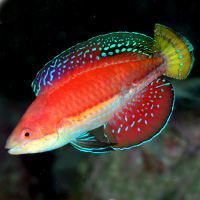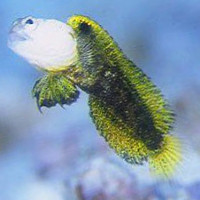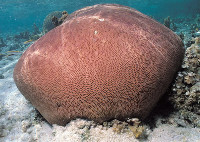
The Biogeography and Evolution of Meiacanthus: Part 7
M. crinitus, lineatus & naeviusThese three species share much in common with M. abditus, including a propensity for shallow-water coastal reefs. Were it not... Read more.

The Biogeography and Evolution of Meiacanthus: Part 6
M. vittatus, luteus, abruptus, vicinus & geminatusThis quintumvirate of West Pacific fishes is easily recognized by the single (or double) stripe running... Read more.

Cirrhilabrus katoi: extremely rare, surprisingly affordable, apparently undesirable
It isn’t always obvious why one species of fish is popular with aquarists and another isn’t. A variety of factors need to be considered—first and foremost... Read more.

A spectacular new miniature jawfish
Indo-Pacific coral reefs are filled with a multitude of fishes thought to represent new species but which yet remain scientifically undescribed, seemingly stuck... Read more.

The Biogeography and Evolution of Meiacanthus: Part 5
M. atrodorsalis, oualanensis, tongaensis, smithi, fraseri, mossambicus & nigrolineatusThe atrodorsalis species complex represents the only widespread Indo-Pacific... Read more.

The Biogeography and Evolution of Meiacanthus: Part 4
M. bundoon, procne & reticulatusThere are two major clades which are recognizable by the lack of prominent stripes along the body, as well as frequently possessing... Read more.

The Biogeography and Evolution of Meiacanthus: Part 3
M. grammistes & kamoharaiIdentifiable by a unique pectoral fin spot and the comblike extensions of the caudal fin, this pair of species exhibits an interesting... Read more.

The Biogeography and Evolution of Meiacanthus: Part 2
M. anemaSurprisingly, this primarily marine genus has a single species which specializes in brackish waters. Specimens of M. anema have been found far upstream... Read more.

The Biogeography and Evolution of Meiacanthus: Part 1
The Biogeography and Evolution of Meiacanthus Blennies are common and familiar fishes to aquarists, generally thought of as benthic creatures who make a living rasping... Read more.

Adopt a Coral Genome for $25!
It’s the season for giving, and what better way to show you care about the health of our planet’s coral reef ecosystems than by directly helping to fund... Read more.

